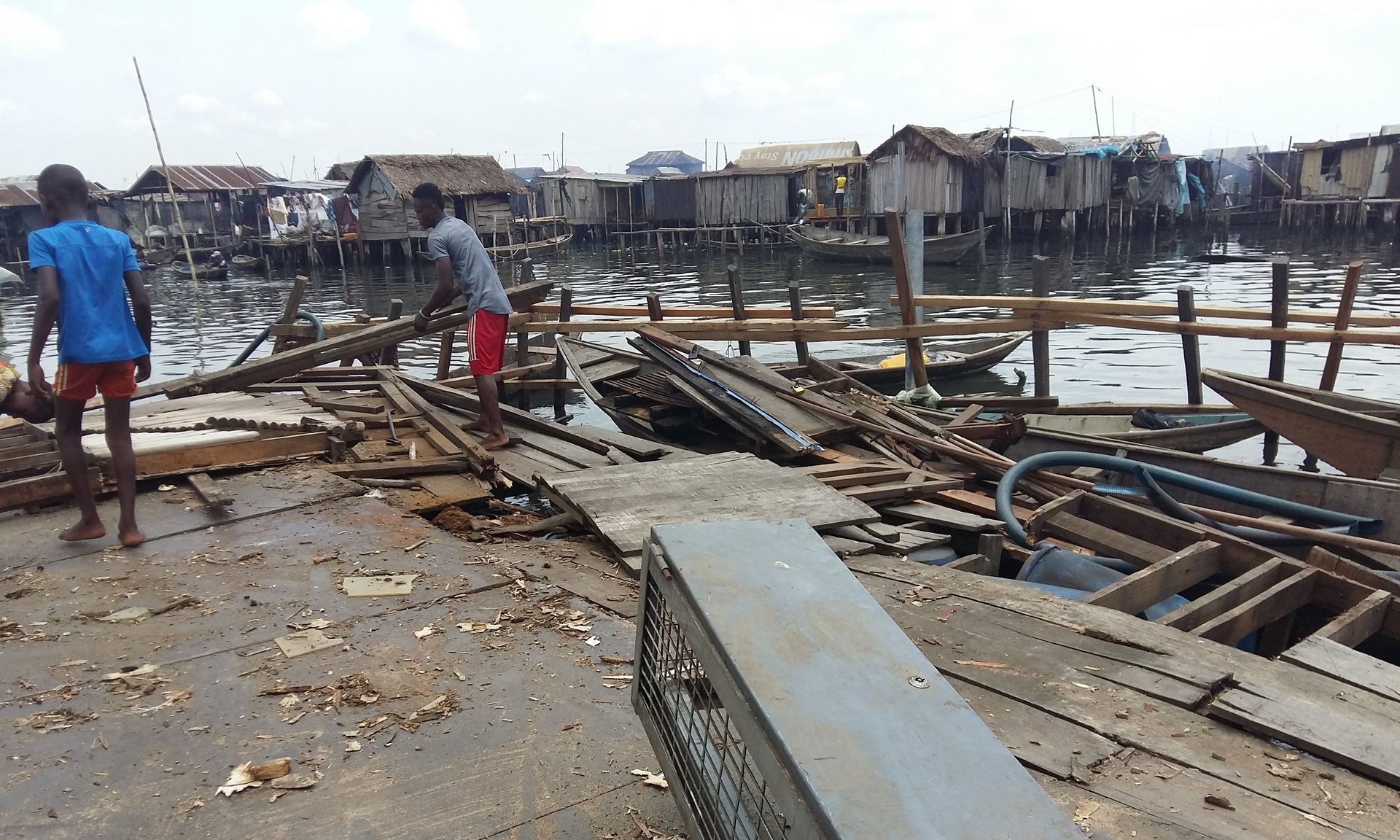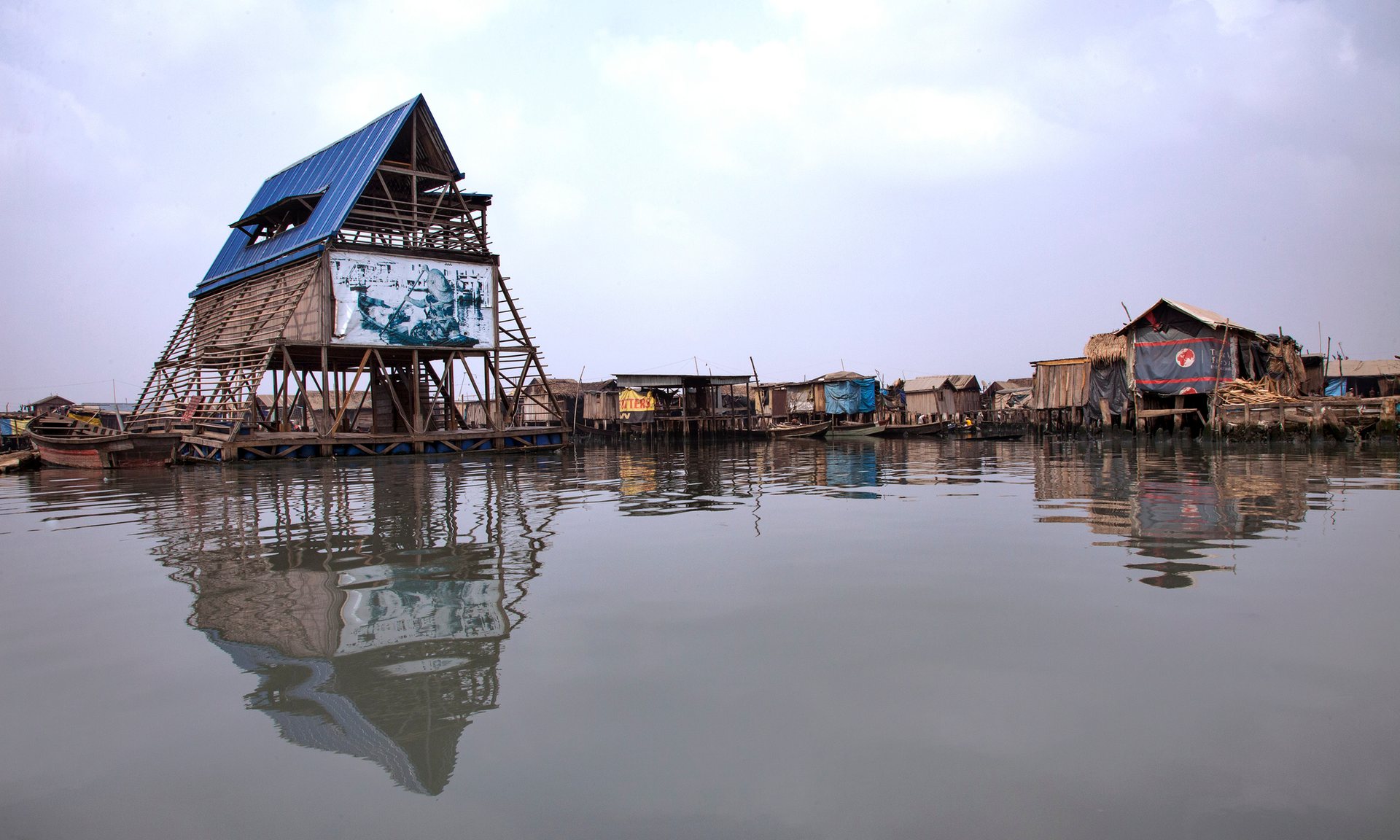Like most Lagos residents, I was familiar with Makoko Floating School. Its steep, three-storey triangular roof was visible from the Third Mainland Bridge, which cuts dramatically across the Makoko lagoon, the city’s vast waterworld slum. Designed by the Nigerian architect Kunlé Adeyemi, the Floating School was the winner of multiple awards for architecture and urbanism, attracting great international attention and acclaim.
But I had never actually been up close until yesterday, when I approached in a rickety wooden canoe piloted by a young man in a burgundy T-shirt and grungy shorts.
All that was left was a floating platform.
At 10.30am on Tuesday, the Floating School collapsed during a heavy seasonal thunderstorm. When I visited two days later, a group of men and children cleared debris from what was left behind: a wooden platform supported by floating plastic barrels and a few broken stilts. Other people sat in canoes, waiting to cart away doors, windows and piles of wood to be used elsewhere in this precarious community.

Noah Shemede is the headmaster of Whanyinna school, which sent its pupils to classes on the floating platform for several months before the collapse. He is devastated: “I watched the whole thing live. There was a storm, and the building of the Floating School was shaking because of the wind. Before I knew it, it had collapsed. Thank God none of my students were there – I moved them three months ago.”
The collapse is a serious blow to the future of the remarkable floating city, which is constantly fighting to avoid demolition and had found a beacon of hope in Makoko Floating School. But the school has always attracted controversy.
Built in 2013 by Kunlé Adeyemi of NLÉ Works – in partnership with organisations including the Heinrich Böll Foundation, UNDP, the Federal Ministry of Environment Africa Adaptation Programme, Yaba Local Council Development Area (LCDA) and the Makoko waterfront – it was designed to function two ways.
Not only would it provide children with an alternative to their original primary school – which was built on reclaimed land prone to flooding – but it would act as a community meeting place.
Adeyemi designed the school using locally sourced wood and bamboo, and floated it atop 250 plastic barrels. The concept won multiple awards and was hailed as reflective of a new style of architecture, created to meet local needs and the practical environmental considerations of this waterfront community.
It also arrived at a crucial time for the city. In 2012, the Lagos state government declared Makoko illegal, and tried to evict its residents in order to raze the entire floating slum. Officials argued Makoko’s living conditions were unsanitary and that it violated environmental legislation. Critics of the demolition countered that its prominent presence on the waterfront embarrassed local officials, and said Makoko was a vibrant community of up to 300,000 people who had adapted to waterfront living with an ingenuity that deserved to be celebrated and assisted.
The Floating School, when it came, gave Makoko a global profile. The government backed away from demolition and instead approved a regeneration plan. The school became a symbol of bottom-up development, its designs even adopted by the state ministry of urban development for new house plans. The collapse throws this process into disarray.

Photograph: Andrew Esiebo for the Guardian
Shemede argues it was an accident waiting to happen. He says he decided to relocate the children to another school under pressure from local parents, who had voiced concerns about the safety of the structure that vibrated in the rain.
Advertisement
There were other concerns. The lagoon community had initially been ecstatic about it, but grew frustrated with the amount of time it took to open: though it was built in 2013, it only welcomed students in October 2015. Some community members were disappointed that the 220 sq metre school could only safely accommodate around 60 students, despite the large number of classes in need of new space in Makoko.
Shemede says he had also complained to Adeyemi about the community being left to maintain the building. He argues that, had the school been one storey tall, like the rest of the buildings in Makoko, it might have been stronger.
However, Adeyemi maintains the structure “collapsed due to wear, tear and damages in the last months”. He says: “Being a first prototype, the structure was expected to have a limited lifespan with some maintenance. It was no longer in use, shored and discussions were incidentally in progress by the community to bring it down this week and salvage some of its reusable equipment and materials.”
One of the men helping clear the rubble on the platform is Jeunbete, Shemede’s older brother, who introduced himself as a leader of the “Houses of Lagoon”, the name local residents use to refer to their waterside community. “The foundation was not too strong,” Jeunbete says, gesturing to the debris. “Kunlé told me that they’ve built a stronger version in Europe, and so he’s going to come and do the same thing here also.”
The stronger version Jeunbete refers to is MFS II, the second generation of the Makoko Floating School, which NLÉ calls “a new, improved iteration” of the original. In a press release, NLÉ said it had plans to upgrade the original before the collapse. It said the original school had served its purpose as a prototype, had been used intensively and had provided exceptional service to the lagoon community.
Adeyemi adds: “At the request of the community leaders and representatives, we are jointly considering the conditions for future operations and their establishment of a responsible management committee under which a new structure would be redeveloped.”
However, the new version, if it comes, won’t include the students of Whanyinna primary school. Shemede intends to build a new school that can fit all 200 Whanyinna students. He has even found a suitable location, close to their current building. “I told Kunlé about it before. He’s going to go ahead with the floating school at the waterfront. But I’m going to build another school. One storey high.”
He is skeptical of NLÉ’s plans to revive the floating school concept.
“No parent will send their child there, given what happened,” he says. “Imagine if I had kept trying to convince the parents that the school is fine and left the students there.”

